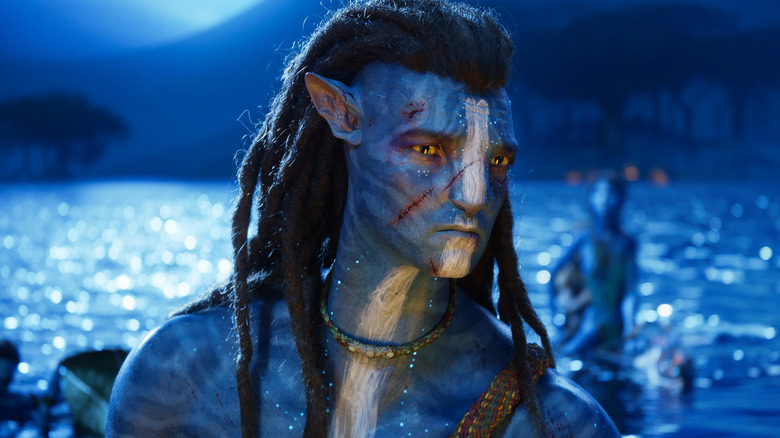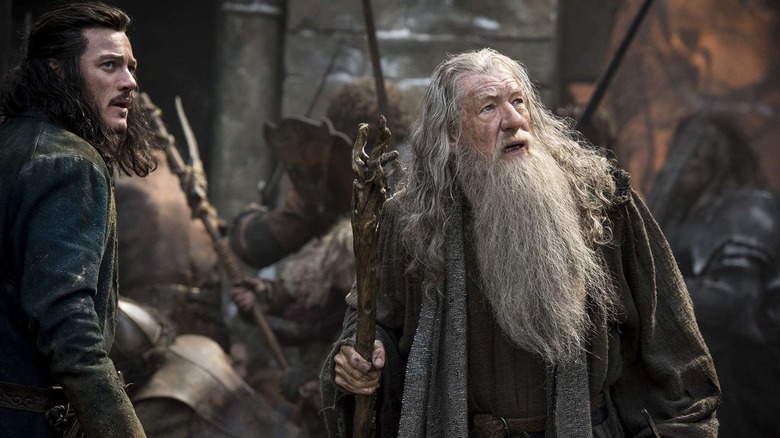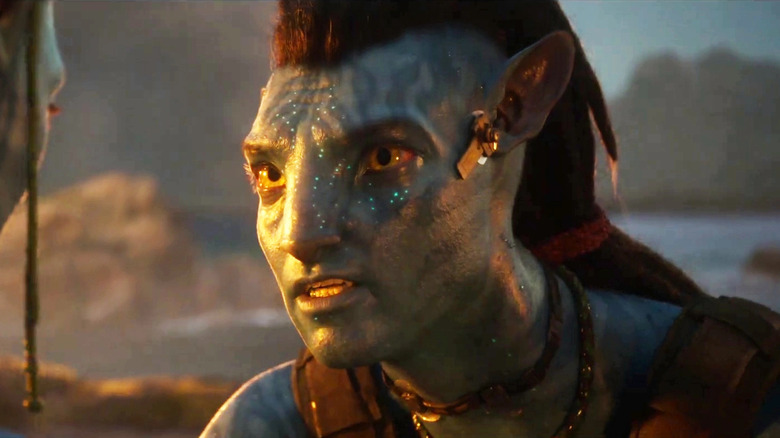James Cameron Put Together A Writers Room To Create A 'Silmarillion' For Avatar
It seems that when James Cameron isn't actively making "Avatar" movies, he's thinking about "Avatar" movies. As the filmmaker admitted in an interview with ScreenRant, he wouldn't allow his co-screenwriters, Rick Jaffa and Amanda Silver, to begin work on "Avatar: The Way of Water" without first reading a massive 800-page tome explaining the mythos and backstory of his sci-fi universe. He has already finished a great deal of work on third and fourth "Avatar" films as well, working with a team of writers. "I walked in on the first day with the whole writers room," Cameron explained, "and I plopped down 800 pages of notes, single spaced. I said, 'Do your homework, and then we'll talk.'"
Cameron is a very technical filmmaker, and has, with his last few films, become intensely interested in pushing the limits of film visuals and special effects. The "Avatar" films, however, are the first time Cameron has allowed himself to take part in the age-old "Dungeons & Dragons"-infected nerdy practice of world-building. His previous sequels were either based on other filmmakers' ideas ("Piranha II: The Spawning" was a sequel to a Joe Dante film, "Aliens" was a sequel to a Ridley Scott film), or weren't so concerned with extended mythology ("Terminator 2: Judgment Day" didn't reveal the extensive fineries of its inevitable machine war). "Avatar: The Way of Water" is Cameron building his own sandbox to play in for the first time.
As the "Avatar" sequels will inevitably progress and introduce more and more characters, Cameron realized he would need a series Bible, as it were. In an interview with Variety, Cameron compared his background notes on "Avatar" to J.R.R. Tolkien's "The Silmarillion."
'I had to write my own 'Silmarillion''
For those unfamiliar with J.R.R. Tolkien's posthumous work, "The Silmarillion" was a 1977 collection of lore and background information that had not been explicitly stated in the "Lord of the Rings" books and "The Hobbit." It's a very detailed, very nerdy compendium of the various kingdoms, species, languages, and general history of Middle-earth. A lot of the fictional languages are based on Finnish. It's not a novel, but an expansive outline and list of rules that Tolkien followed. Reading "The Silmarillion" is, for a "Lord of the Rings" nerd, the final 1,000 feet up the summit of fandom.
James Cameron, when looking at the new TV series "Lord of the Rings: The Rings of Power," understood that "The Silmarillion" played a vital part in its making. He knew that because that's what he was doing simultaneously on the production of his "Avatar" movies:
"If you look at something like 'The Rings of Power,' with those multiple storylines and interesting characters, that's what I was aspiring to. But they had a guide; I didn't. I had to write my own 'Silmarillion' or 'Lord of the Rings' in the form of notes. But I also didn't want to do it all alone. I knew that I was going to do multiple movies, so I created a little writers' room like you would for a TV show."
Cameron has yet to reveal any additional details about life on Pandora, but one can likely assume that his "Avatar" Bible includes things like planetary weather conditions, the level of gravity, the age of the planet, and other mystical and scientific details about the living Earth Mother that lives throughout the planet's core, Eywa.
The dangers of world-building
While these kinds of series Bibles are vital for an ongoing TV series or an elaborate novel, they can invite their own creative dangers. A showrunner or filmmaker can rely on a Bible when a hired screenwriter requires a particular detail for story reasons; how fast can a starship travel, for instance? Or how long do Yodas live? But the moment an author begins to focus on their extant lore and massive fictional mythology over basic storytelling or depth of character, the film in question runs into trouble.
One can see this at work in many of the YA fantasy films that came into vogue after the success of "Harry Potter," including in many of the "Harry Potter" films themselves. Starting with David Yates' "Harry Potter and the Order of the Phoenix" in 2007, massive details would be thrown into an already-complicated story with casual abandon. Those already familiar with the source material would understand the significance of a character like Kreacher, or know that Ron Weasley had an additional brother that, in the films, hadn't been previously mentioned. Those who hadn't read the books would be treated to a mere litany of details, rather than an intriguing story.
And when a filmmaker is the only one familiar with a massive fictional world they've created, there can be a tendency to absentmindedly forego a proper introduction to audiences. It seems the world of "Avatar" is going to be far more elaborate than has been seen in the two films to date. Audiences can only hope James Cameron possesses the wherewithal to lower them in slowly.
"Avatar: The Way of Water" is now playing in theaters.


